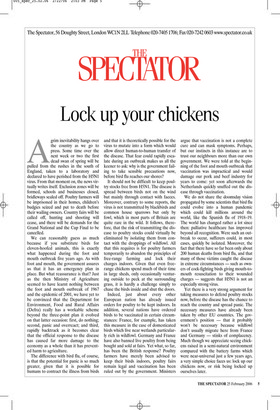Lock up your chickens
Agrim inevitability hangs over the country as we go to press. Some time over the next week or two the first dead swan of spring will be pulled from the rushes in the south of England, taken to a laboratory and declared to have perished from the H5N1 virus. From that moment on, the news virtually writes itself. Exclusion zones will be formed, schools and businesses closed, bridleways sealed off. Poultry farmers will be imprisoned in their homes, children’s budgies seized and put to death before their wailing owners. Country fairs will be called off, hunting and shooting will cease, and there will be demands for the Grand National and the Cup Final to be cancelled.
We can reasonably guess as much because if you substitute birds for cloven-hoofed animals, this is exactly what happened during the foot and mouth outbreak five years ago. As with foot and mouth, the government assures us that it has an emergency plan in place. But what reassurance is that? Just as the then Ministry of Agriculture seemed to have learnt nothing between the foot and mouth outbreak of 1967 and the epidemic of 2001, we have yet to be convinced that the Department for Environment, Food and Rural Affairs (Defra) really has a workable scheme beyond the three-point plan it evolved on that latter occasion: first, do nothing; second, panic and overreact; and third, rapidly backtrack as it becomes clear that the official response to the disease has caused far more damage to the economy as a whole than it has prevented harm to agriculture.
The difference with bird flu, of course, is that the potential for panic is so much greater, given that it is possible for humans to contract the illness from birds and that it is theoretically possible for the virus to mutate into a form which would allow direct human-to-human transfer of the disease. That fear could rapidly escalate during an outbreak makes us all the keener to ask: why is the government failing to take sensible precautions now, before bird flu reaches our shores?
It should not be difficult to keep poultry stocks free from H5N1. The disease is spread between birds not on the wind but mainly through contact with faeces. Moreover, contrary to some reports, the virus is not transmitted by blackbirds and common house sparrows but only by fowl, which in most parts of Britain are quite rare in the wild. It follows, therefore, that the risk of transmitting the disease to poultry stocks could virtually be eliminated by isolating them from contact with the droppings of wildfowl. All that this requires is for poultry farmers temporarily to abandon the principles of free-range farming and lock their charges indoors. Given that even freerange chickens spend much of their time in large sheds, only occasionally venturing outside to peck at the surrounding grass, it is hardly a challenge simply to chase the birds inside and shut the doors.
Indeed, just about every other European nation has already issued orders for poultry to be kept indoors. In addition, several nations have ordered birds to be vaccinated in certain circumstances: France, for example, has taken this measure in the case of domesticated birds which live near wetlands particularly rich in wildfowl. Germany and France have also banned live poultry from being bought and sold at fairs. Yet what, so far, has been the British response? Poultry farmers have merely been advised to keep their birds indoors, poultry fairs remain legal and vaccination has been ruled out by the government. Ministers argue that vaccination is not a complete cure and can mask symptoms. Perhaps, but our instincts in this instance are to trust our neighbours more than our own government. We were told at the beginning of the foot and mouth outbreak that vaccination was impractical and would damage our pork and beef industry for years to come: yet soon afterwards the Netherlands quickly snuffed out the disease through vaccination.
We do not share the doomsday vision propagated by some scientists that bird flu could evolve into a human pandemic which could kill millions around the world, like the Spanish flu of 1918–19. The world has changed rather a lot since then: palliative healthcare has improved beyond all recognition. Were such an outbreak to occur, sufferers could, in most cases, quickly be isolated. Moreover, the fact that there have so far been only about 200 human deaths from bird flu, and that many of those victims caught the disease in extreme circumstances — such as owners of cock-fighting birds giving mouth-tomouth resuscitation to their wounded charges — suggests that H5N1 is not an especially strong virus.
Yet there is a very strong argument for taking measures to defend poultry stocks now, before the disease has the chance to reach the country and spread panic. The necessary measures have already been taken by other EU countries. The government’s position — that it probably won’t be necessary because wildfowl don’t usually migrate here from France and Germany — stinks of complacency. Much though we appreciate seeing chickens raised in a semi-natural environment compared with the battery farms which were near-universal just a few years ago, a very simple choice faces us: lock up our chickens now, or risk being locked up ourselves later.


































































 Previous page
Previous page